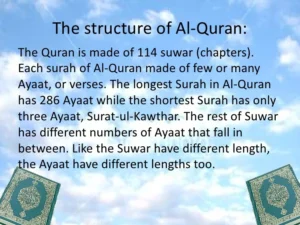The “Al-Qur’an”is more than a religious scripture; it is a comprehensive manual for living a righteous, meaningful, and purpose-driven life. Regarded by Muslims as the literal word of Allah (God)the Qur’an serves as the “eternal guidance” for humanity, addressing every aspect of human existence—spiritual, moral, legal, and social. Revealed over a span of 23 years to the Prophet Muhammad ﷺ through the Angel Jibreel (Gabriel), Al-Qur’an remains a timeless source of wisdom, clarity, and peace.
- The Revelation and Preservation
The Qur’an was revealed in the “7th century CE”in Classical Arabic, a language chosen for its depth and eloquence. The first verse revealed was:
“Read in the name of your Lord who created.”
(Surah Al-‘Alaq, 96:1)
This moment marked the beginning of a transformation in Arabia and beyond. The Qur’an was not revealed all at once, but gradually, in response to various situations, questions, and societal needs. This allowed the early Muslims to internalize and implement its teachings.
What is truly remarkable is the Qur’an’s “preservation”. It has been memorized by millions (called “Huffaz”), and not a single word has been changed since its revelation. As Allah Himself promises:
“Indeed, it is We who sent down the Qur’an and indeed, We will be its guardian.”
(Surah Al-Hijr, 15:9)
- Purpose and Message
At its core, the Qur’an serves “five key purposes”
1. Guidance (Huda):
The Qur’an provides a path for those who seek righteousness. It differentiates truth from falsehood and right from wrong.
2. Legislation (Shariah):
It lays down laws for justice, ethics, and morality—covering areas like marriage, trade, inheritance, and criminal justice.
3. Spiritual Growth:
It connects the soul to its Creator, encouraging prayer, gratitude, patience, and self-reflection.
4. Warning and Good News:
It warns against arrogance, disbelief, and injustice, while promising Paradise to those who believe and do good deeds.
5. Universal Relevance:
Although revealed in a specific time and place, its messages are universal, transcending cultures, ethnicities, and eras.
- Structure of the Qur’an
The Qur’an consists of 114 Surahs (chapters) and over 6,000 verses (Ayahs). The chapters are not arranged chronologically but thematically and by length. Some of the prominent chapters:

- Al-Fatiha: Opening prayer and guidance
- Al-Baqarah: Laws, stories of past nations
- Yaseen: The heart of the Qur’an; resurrection
- Ar-Rahman: Divine mercy and blessings
- Al-Ikhlas: Absolute monotheism
Each chapter contains layers of meaning, metaphor, and moral direction. Reciting and reflecting upon the Qur’an is not just encouraged but considered an act of worship in Islam.
- Scientific and Moral Wisdom
While the Qur’an is primarily book of guidance , it also contains “numerous scientific insights”—many of which align with modern discoveries. For example:
- Embryology
The Qur’an describes the stages of human development in the womb with remarkable accuracy (Surah Al-Mu’minun, 23:12–14). - The Expanding Universe
“And the heaven We constructed with strength, and indeed, We are \[its] expander.”
(Surah Adh-Dhariyat, 51:47)
This aligns with the scientific theory that the universe is constantly expanding.
In terms of “morality” the Qur’an provides unchanging standards of truth, justice, and compassion. It strongly condemns oppression, dishonesty, and cruelty, and encourages kindness to parents, orphans, and the needy.
- A Book for Reflection and Action
The Qur’an repeatedly calls on readers to reflect (tadabbur) on its verses:
“Do they not reflect upon the Qur’an, or are there locks upon \[their] hearts?”
(Surah Muhammad, 47:24)
Reflection leads to internal change. The Qur’an is not just to be read but lived. Its teachings are meant to influence behavior, decisions, and relationships.
- Some of the most powerful values emphasized include:
Tawheed (Oneness of God)
Taqwa (God-consciousness)
Sabr (Patience)
Shukr (Gratitude)
Amanah (Trust)
- Relevance in Today’s World
In a time marked by materialism, injustice, and spiritual emptiness, the Qur’an offers clarity and purpose. Its guidance is relevant in addressing:
Mental health and inner peace
Family and community values
Social justice and equity
Ethical finance and business
The Qur’an does not just diagnose the problems of the world—it offers solutions rooted in divine wisdom.
- How to Connect with the Qur’an
Engaging with the Qur’an is a lifelong journey. Here are a few practical steps:
1. Daily Recitation: Even a few verses a day can be spiritually uplifting.
2. Understand the Meanin: Use translations and tafsir (exegesis) to grasp deeper meanings.
3. Apply the Teachings: Let the Qur’an influence your actions and decisions.
4. Join Study: CirclesLearning in groups enhances understanding and accountability.
5. Teach Others: Share the knowledge and encourage reflection.

- A Universal Message
Though it was revealed in Arabic and to a specific prophet, the Qur’an’s message is for all of humanity. It addresses both the individual and society, the believer and the skeptic, the young and the old. Its universality is one of its most compelling features.
“This is the Book about which there is no doubt, a guidance for those conscious of Allah.”
(Surah Al-Baqarah, 2:2)
- Conclusion
The “Al-Qur’an” is not just a book—it is a conversation between the Creator and His creation It speaks to the heart, the intellect, and the conscience. For those who approach it sincerely, it becomes a source of “light in times of darkness”, “clarity in confusion” and “hope in despair”.
As humanity continues to grapple with crises—moral, environmental, and spiritual—the Qur’an remains a “beacon of timeless guidance”, waiting to be embraced and lived.





